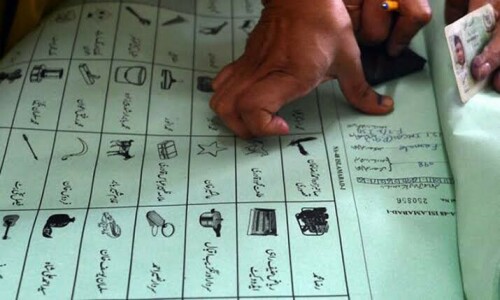ISLAMABAD: Calling political parties and parliamentarians to immediately initiate a political dialogue on wide-ranging reforms to improve the election system, the Free and Fair Election Network (Fafen) on Friday said the Election Commission should be completely independent in appointing officials and setting procedures.
The elections watchdog, in a press release issued here, said the Election Commission of Pakistan (ECP) needs to be empowered to exercise its constitutional authority over the government entities to ensure they do not get involved in electoral processes without specific direction from the commission.
It said the ECP should be able to suspend any public functionary who, during an election, fails to comply with its directives, despite notice. Moreover, the presiding officers should be given full authority over police and security forces in enforcing the rules at the polling stations to avert any interference in the voting.
Fafen pointed out that erring electoral officials drawn from lower judiciary and executive should be taken to task as a prerequisite for free, fair and transparent elections.
The legislative and procedural framework that governs elections in Pakistan has become obsolete, leaving ample opportunities and spaces for irregularities that create conducive environment for rigging, said the press release.
“Unless the independence of the Election Commission is translated into complete authority and erring electoral officials drawn from lower judiciary and executive are taken to task, elections will continue to be marred by question of credibility.”
Fefen reveals that as many as 71,397 irregularities and violations of electoral processes were observed in 38,274 polling stations across 263 National Assembly constituencies on the Election Day (May 11, 2013).
Among the more critical irregularities, 5,142 instances related to pre-voting preparations and procedures were recorded in 3,449 polling stations. It further pointed out that voter identification procedures were not implemented in as many as 2,567 polling booths while ballot processing procedures for each voter was not adhered to in 3,054 polling booths.
In addition, incidents of ballot stuffing were observed in 1,303 polling booths and incidents of voter and polling official intimidation were observed in 2,435 polling booths during the voting, said the report.
The process of vote counting and consolidation were closely observed in 16,933 polling stations. The observers recorded as many as 17,358 incidents of procedural violations in the vote counting processes.
Furthermore, the observers recorded 7,331 irregularities and violations in the documentation and dissemination of polling station level results.
Fefen, in its analysis of the election results of 266 constituencies, identified a significant increase in the number of rejected votes, which was increased from 775,720 in 2002 to 973,694 in 2008 and reached an all-time high of 1,502,717 in 2013 – an increase of 54 per cent compared to 2008 elections.
The election watchdog said that the issue was of a critical nature not merely due to the numbers but also given the skewed distribution across constituencies and regions. The numbers range from 0 in NA-53 to 25,562 in NA-266.
The number of rejected votes exceeds the margin of victory in 35 of the 266 constituencies analysed, revealed the report.
The watchdog pointed out that the ECP should be given authority to appoint election officials, including the District Returning Officers (DROs) and Returning Officers (ROs) with full powers over the seconded staff to direct, sanction and remove them for misconduct.
Similarly, the serving judges of the superior and subordinate judiciary shall not be assigned the responsibilities as DROs and ROs as it can influence the election dispute settlements in the post-election phases.















































